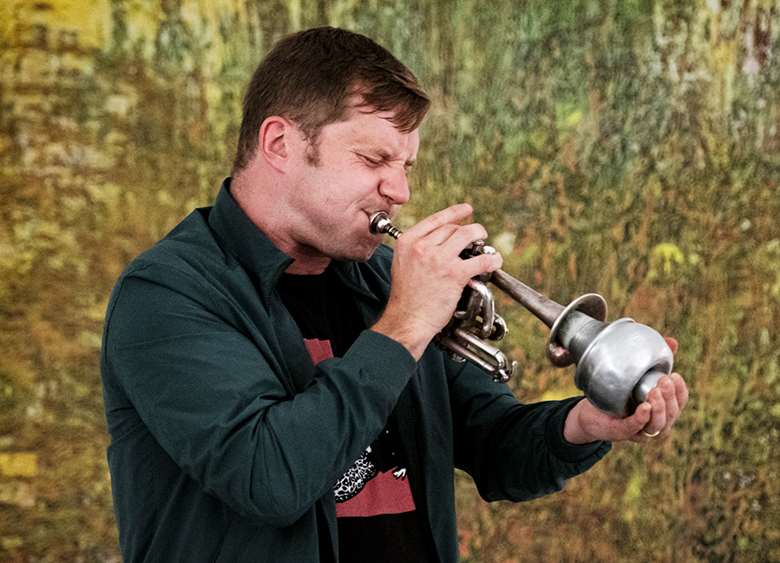Peter Evans powers up at Cologne’s Week Of Surprise Festival
Martin Longley
Tuesday, November 16, 2021
Martin Longley reports back from a week of superbly surprising concerts from this intriguing German music festival

In previous incarnations the Week Of Surprise has always been the Night Of Surprise, as Cologne was taken over by multiple simultaneous performances, with free admission and constant overlapping. Chance encounters were actively intended by the artistic director Thomas Glaesser. For the 2021 edition, with virus restrictions remaining forevermore, the Surprise spread itself out for six days, with most gigs happening at the Stadtgarten venue. It was possible this time to catch virtually every act, which might have removed a core ethos of this festival, but still retained its sense of musical adventure.
Stateside trumpeter Peter Evans played in two settings, firstly with his Cologne Quartet, in the Martina Kaiser art gallery. This displayed his new music tendencies, although still camped in the free improvisation zone, closest in feel to the Spontaneous Music Ensemble. Five years ago, Evans began working with Akiko Ahrendt (violin), Elisabeth Coudoux (cello) and Florian Zwissler (analogue synthesizer), with the latter playing quietly enough to meld with the acoustic palette, as well as challenging its careful ‘purity’. Evans played pocket trumpet at first, his tones maintained in an ascendant position, as Coudoux’s angry strikes seemed to prompt the leader’s horn into a perturbed, growling state, a mute inserted for a micro-fanfare. The quartet accumulated an insistent swarming density, loaded with an elephantine synth-bass presence, acting as a tuba equivalent. Zwissler then rose up to a trombone range, creating a siren variance, as relationship changes permeated the space, each player rising or falling at different, sympathetic times. As a thinning-out occurred, trumpet and violin were left to concentrate on higher patterns of detail.
The next day, Evans delivered an even more impressive set at Stadtgarten, in a duo setting with Austrian pianist and electronicist Elias Stemeseder. This involved a much faster, harder and more complicated rapport, both artists well-matched in their virtuosi tussling abilities. Reaction times were stunning. Microphone was hooded by trumpet bell for intimate plumbing qualities, sporadic bursts of powerful scuzz. Isolated trumpet brevity marked the cavalry call, against a contrasting flow of acoustic piano trinkling and abrasive bursts of sequenced chirps. Evans kissed into his pocket trumpet, pecking out rapid dots. Stemeseder often operated down at the felt-bass shudder end, while Evans vocalised into his tubing. There were also pools of calm melodic painting, as ‘My Funny Valentine’ was negotiated in a moderately straight fashion.

Perhaps due to these Covid times, there were a few other duos peppered around the week. Norwegians Maja Ratke and Stian Westerhus (above) gave an intense performance, veering from serene folk song to confrontational extremity. Ratkje massaged her pump organ, while Westerhus made a rare appearance on acoustic guitar, with both sharing the vocal duties. The thin, high, faded Goth-choirboy fragility of Westerhus was not so appealing, but Ratkje’s darker tones carried greater emotional import. The pair created a kind of cowboy church mourning, harmonising together, or with Ratkje whistling while she shivered her violin strings. Grim and sparse, the set took an unexpected turn when Westerhus hoisted a heavy metal mallet and proceeded to smash the small objects around his feet. Thankfully not the effects pedals that would have been there if he’d been using his customary electric guitar. This was surely one of the biggest surprises of the week!
Another Stadtgarten duo set was given by singer Sofia Jernberg and pianist Alex Hawkins, their songbook containing old numbers from Ethiopia and Sweden, the set concluding with ‘What The World Needs Now Is Love’. As might be expected from this resourceful pair, the songs were mostly deconstructed, acting as fuel for fruitful improvisation, even if their verses remained intact. Both Jernberg and Hawkins were full of variations and embellishments that they threaded into the linear structures, all conjoined with shadings into wordless expression or briefly chaotic key-flourishes. It was beneficial to hear Jernberg utilising her glottal extremities one moment, then becoming an almost conventional songstress the next.
The festival also featured strong sets by Pat Thomas, Julien Desprez, and another duo pairing, this time with Fred Frith and Lotte Anker…